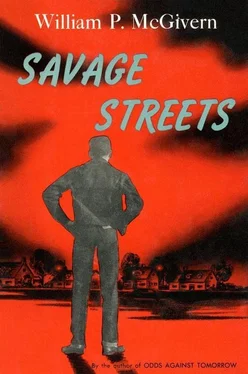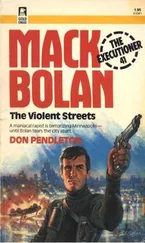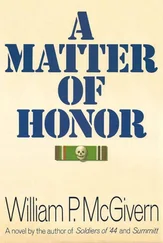“Just listen a second,” Detweiller was saying to Barbara. “I’m not trying to shock you and I’m not just talking for effect. Nobody has bothered my son. Technically I’m an innocent bystander to all this, though I’m ready and happy to do all I can to help John and Sam. Hell, it’s a community problem, isn’t it? But I’ll tell you this: if any of these punks bother Bobby I can handle them without help from anybody.” Detweiller poured himself a short drink from the bottle Farrell had left at his elbow. “Nobody’s pushing me around, understand?”
Detweiller was heating himself up with verbal muscle-flexing, Farrell realized, intoxicating himself with these big, heady boasts. Barbara’s presence was spurring him on, he guessed; she sat with slim legs crossed, lamp glinting on her smooth brown hair, listening to him with flattering gravity, obviously disturbed by his violent talk. Chicky on the other hand looked bored. She was sipping her drink, studying a beam of light flickering on the toe of her slowly swinging loafer. Her small face was still, and her masked brown eyes were turned down and away from Detweiller’s voice and gestures.
“John, help me,” Barbara said almost angrily. “Tell him he’s wrong.”
“I’ll help you,” Chicky said with a short laugh. “Det thinks the only way to prove anything is by hitting somebody. His idea of a subtle, well-reasoned argument is to twist my arm until I agree with him.”
“Well, results count, don’t they?” Detweiller said, looking at her with a stiff smile.
“Other methods get results, too,” she said. “Happier ones, I’ve been told.”
“Look, I’m going to the police tonight,” Ward said. “Are you with me, John?”
“Sure,” Farrell said. “We’re wasting time with this talk. Det, I’m not planning to chase a bunch of teen-agers down dark alleys to settle our problems. It might be fun, but we’d probably all come down with coronaries after a block or two.”
“Well, I hope you can get the cops interested,” Det said, “but I’ll be surprised if you do.” In rising he almost tipped over his chair. “Well, what do you know? Old Det is pie-eyed. Chicky, let’s take me home.”
She watched him with a little smile crinking the comers of her eyes. “Okay, slugger,” she said. “In another round you’d have had him. Come on. Night, Barbara. Thanks the usual million.”
The offices of the Rosedale police were located on a quiet, well-lighted street a block away from the noisy confusion of Whiting Boulevard. The large, whitestone building also housed state and county administrations; a magistrate’s court; the offices and meeting rooms of the water board, Transit Authority and various tax bureaus. The graveled approaches to the building circled a neatly manicured little park, and the parking space flanking its imposing columned doorways was reserved for officials.
“It’s hell to be a civilian,” Ward said, as they went up the broad flight of steps. They had been forced to park on the street and Ward was in an irritable mood. “These civil service drones all act like they’re doing you a big favor,” he said, as they pushed their way through the heavy, plate-glass doors. “Whether you’re reporting a fire or taking out a dog license or paying your goddamned taxes — they all act like they’ve got ten thousand more important things on their minds. Christ, I’ll bet ninety-eight percent of them couldn’t hold a job in private industry.”
They told their story to a uniformed officer on duty behind a freshly varnished counter on the first floor of the building. On his right a sergeant sat at a switchboard and behind him another officer was issuing and confirming orders to squad cars by short-wave radio.
When they completed their account the officer nodded alertly but sympathetically, and told them they had come to the wrong place; the detective division in the Hayrack district would have jurisdiction in this matter, he explained, and gave them the address of the station house.
They thanked him and walked back down the graveled roadway to their cars.
“Det would say I told you so,” Ward muttered irritably. “The old runaround — it’s starting already. That’s what he told us to expect.”
“You mean Commissioner Detweiller of the Yard?” Farrell said. “You got that from him personally?”
Ward smiled. “He was in great form tonight, wasn’t he? You think he was serious about banging those kids around ourselves?”
“I don’t think he knows himself.”
“He might be right at that.”
“Sure. The odds are against him being wrong all the time.”
“He must have got under your skin, John.”
Farrell considered that for a few seconds, and then said, “It’s this whole damn business that’s got under my skin. I shouldn’t blame Det for that. He means well enough, I guess.”
The glass doors of the Hayrack police station gleamed opaquely in the bright light of the green electric globes hanging on either side of the entrance. The building was two-storied and ancient, made of soot-dulled red brick and squeezed into place in a block of depressed-looking shops and old-fashioned frame houses. There was a bar at the comer with a circular neon sign blinking above it, and a delicatessen a few doors from it with cans of beer displayed in stacks behind a dirt-streaked plate-glass window. Several of the old wooden homes had ROOMS signs in their windows, and directly opposite the station house was a junk shop with a collection of yellowing bathtubs and ice boxes and primitive washing machines displayed on the sidewalk, these secured against improbable theft by a chain that snaked through their insides and locked them all together into one immense and ludicrous package.
As he waited for Ward to park his car, Farrell wondered why he felt so out of place in this neighborhood. It occurred to him that he couldn’t quite imagine himself living here; drinking in the corner bar, shopping in the delicatessen, or coming down the sidewalk to turn into any of these ancient, paint-starved dwellings. A wind rose in the street driving flurries of dust and flaking cigarette stubs along the gutters, and he turned his back to it and pulled his coat collar up about his neck. It wasn’t that the neighborhood was poor, he thought; it was simply unreal to him, an atavism, something belonging in another time. The rust-streaked bathtubs in the junk shop, the tired old houses with the signs in their windows, the whole street, for that matter, was like a movie set of the Thirties, dingy and depressed, colored with the lifeless shades of shabby defeat; it was rather unbelievable in the present world of six-to-one martinis, charcoal-broiled steaks and country clubs, of Evinrude for Everyman and spinning traffic rotaries ablaze with the gleaming, fin-tailed cars that were too big to park in the city or squeeze into garages smaller than airplane hangars.
As Farrell went up the worn steps of the station house with Ward he recalled an idea of Weinberg’s for an automobile account the agency had submitted ideas on: concentrate on the tail-end of the car, had been Weinberg’s thesis, festoon the rear hub caps with ceramic inlay, plaster the trunk and rear bumpers with distinctive insignia, lights and gadgets because — because, Farrell mentally added Weinberg’s stress — you couldn’t close most garage doors on the new big cars, and their rear ends hit the owners’ friends in the eye when they settled down around the barbecue pit for what he called the “oral-satisfaction-cum-getting-loaded-bit.”
In the station house two uniformed patrolmen were standing at the window of the House Sergeant’s office, and a gray-haired man in blue uniform trousers and a gray work shirt was sweeping dust and cigar wrappers and cigarette stubs down the corridor. The patrolmen glanced curiously at Ward and Farrell, then moved aside to make room for them at the window. Farrell thanked them and explained the nature of their complaint to the House Sergeant, who listened with an air of impassive suspicion, and then directed them to the Detective Division on the second floor. “That’s an investigative job you got there,” he said. “They’ll take care of you upstairs.”
Читать дальше












